Review: Clonizer
Clonizer: A Moderately Engaging Exercise in Tactical Deckbuilding
The deckbuilding genre has, in recent years, witnessed a veritable deluge of titles attempting to capitalize on the runaway success of genre-defining works like Slay the Spire. Into this increasingly saturated marketplace comes Clonizer, the latest offering from Juicy Plume, a studio whose previous contributions to the gaming landscape have been, shall we say, modest at best. Having dedicated approximately 17 hours to this hex-based tactical deckbuilder—meticulously documenting my observations with my treasured Montblanc Meisterstück—I find myself in the peculiar position of being neither overwhelmingly impressed nor particularly disappointed.
Mechanical Framework: Competent, If Somewhat Derivative
Clonizer positions itself at the intersection of tactical hex-based combat and roguelike deckbuilding—a combination that is hardly revolutionary in today’s market. Players assume control of a “Clonizer” vessel, capable of generating an army of diminutive “Clonees” who serve as your primary agents on procedurally generated planetary surfaces.
The core gameplay loop involves traversing a galaxy map, completing missions on various planets, and gradually augmenting your deck with increasingly potent cards. The hex-based combat system, while serviceable, lacks the tactical sophistication found in more distinguished titles such as the criminally underappreciated “Duelyst,” though I must acknowledge that the spatial manipulation mechanics do offer moments of genuine strategic consideration.
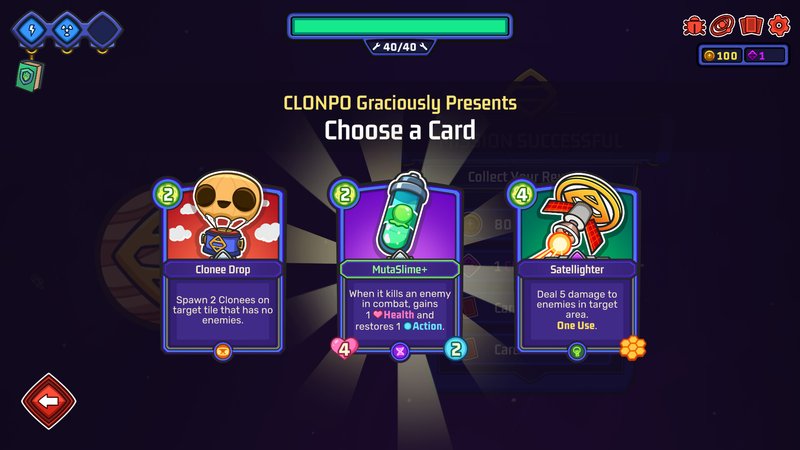
The card selection interface presents a reasonable variety of tactical options, though the design language occasionally veers into the realm of the pedestrian. Note the “Clonee Drop” card, which allows for the spawning of two clones on an empty tile—a spatial manipulation mechanic that, while functional, pales in comparison to the elegant positional play found in more sophisticated titles.
The deck construction elements adhere to established genre conventions: defeat enemies, complete objectives, and select from a rotating array of card rewards. The implementation is competent, if somewhat uninspired. One might be reminded of the vastly superior resource management systems in “Chronicle of the Eternal Saga,” a rather obscure Japanese deckbuilder that demonstrated considerably more mechanical depth in its economy.
Aesthetic Presentation: Serviceable Whimsy
Clonizer adopts a distinctly whimsical aesthetic that is clearly designed to appeal to a broader audience beyond the hardcore deckbuilding aficionado. The art direction features diminutive robotic entities, crystalline formations, and a color palette dominated by deep purples and blues—all rendered in a minimalist style that has become rather de rigueur in the indie gaming sphere.
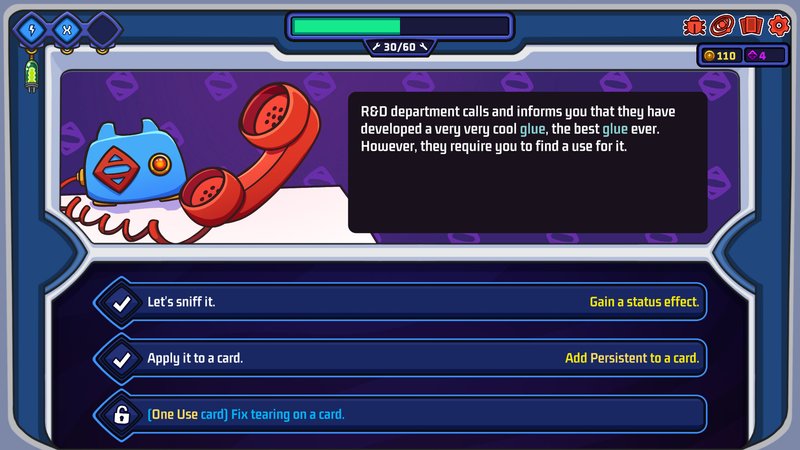
The event system presents occasional narrative diversions that, while charming in their simplicity, lack the narrative depth one might expect from a title with pretensions toward roguelike storytelling. The above scenario—featuring the R&D department’s development of “the best glue ever”—exemplifies the game’s rather simplistic approach to worldbuilding. The choices presented are mechanically relevant but narratively shallow, offering little in the way of meaningful character development or world-building.
The UI elements are clean and functional, though they occasionally suffer from what I can only describe as a certain pedestrian quality. Resource indicators, progress bars, and action points are all clearly displayed, but the overall design lacks the refined sophistication one finds in more premium offerings in the genre.
Economic Systems: Adequately Implemented
The in-game economy presents a standard array of currencies and resources, utilized for purchasing cards, upgrades, and various “Goodies” that provide passive benefits. The merchant interface is functional, if somewhat derivative of more distinguished titles in the genre.
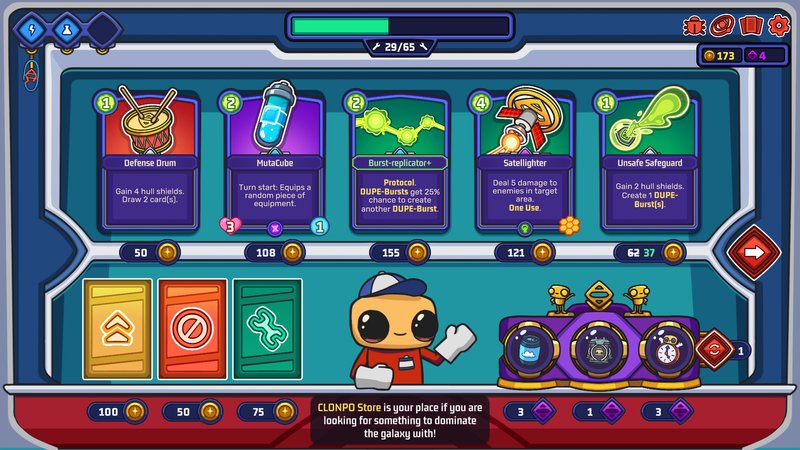
The shop presents a typical array of cards and items, each with reasonably interesting strategic implications. The “Defense Drum” granting hull shields and card draw, the “MetaCube” with its equipment focus, and the “Burst-replicator” with its DUPE-Burst protocol all present potentially intriguing tactical options. However, the economy system lacks the elegant depth found in more sophisticated implementations.
Of particular note is the “Goodies” system, which allows players to equip a limited number of passive benefits. The constraint of three maximum Goodies creates some moderately interesting decision points, though the system never quite achieves the depth of the Relic system in Slay the Spire or the sublime equipment mechanics in “Frost Haven Chronicles.”
Tactical Depth: Moments of Genuine Interest
The hex-based combat system does occasionally produce moments of genuine tactical interest. The interplay between clone positioning, card effects, and environmental features can create scenarios that require thoughtful consideration.
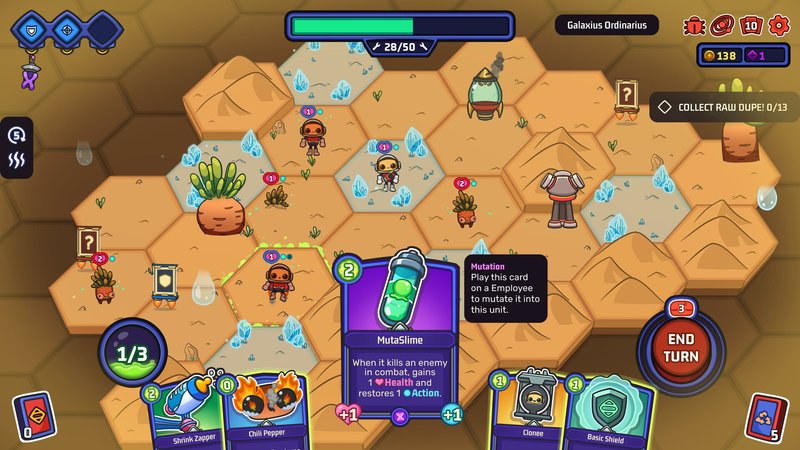
The “MutaSlime” card shown above, which affects “Employoie” units, demonstrates a reasonable attempt at creating synergistic card interactions. The implementation, while not achieving the sophisticated heights of, say, “Dominion: Prosperity’s” more nuanced card interactions, does provide a modicum of strategic depth.
The game’s various mission objectives—saving dams, mining precious ore, defending against raids—add welcome variety to the proceedings. The time pressure of “Raid incoming in 5 turns!” creates a sense of urgency that enhances the tactical decision-making process.
Progression Systems: Adequate, If Predictable
Clonizer’s progression systems adhere to established genre conventions. Players traverse a galaxy map, selecting from branching paths that lead to various encounters: combat missions, merchants, events, and the occasional elite enemy.
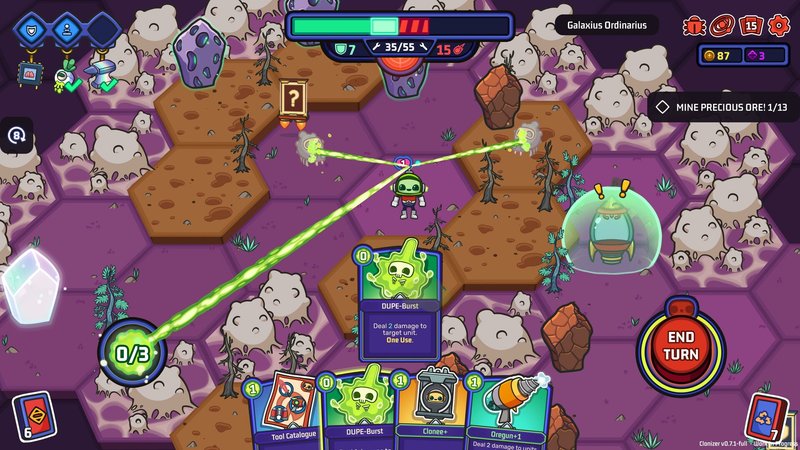
The resource gathering mechanic shown above (“MINE PRECIOUS ORE! 1/13”) exemplifies the game’s approach to mission objectives. While functional, these objectives rarely transcend their mechanical underpinnings to create truly memorable gameplay moments.
The meta-progression between runs is similarly conventional. Players unlock new cards, spaceships, and customization options through repeated playthroughs. The different Clonizer ships do offer meaningfully distinct playstyles—one focusing on equipment, another on direct damage—which adds a welcome layer of variety to subsequent runs.
Conclusion: A Competent, If Unremarkable, Addition to the Genre
Clonizer occupies a curious position in the deckbuilding landscape. It is neither innovative enough to be considered a genre-advancing title nor flawed enough to be dismissed outright. The game demonstrates competence in its implementation of established mechanics but rarely transcends the boundaries of convention to deliver truly memorable gameplay experiences.
For the deckbuilding enthusiast who has exhausted the more distinguished titles in the genre, Clonizer offers approximately 15-20 hours of moderately engaging gameplay. The hex-based tactical elements provide moments of genuine strategic consideration, and the progression systems, while conventional, are implemented with reasonable competence.
However, for those seeking innovation, narrative depth, or mechanical sophistication, Clonizer may prove somewhat disappointing. The game’s whimsical aesthetic and accessible mechanics seem calibrated to appeal to a broader audience rather than the hardcore deckbuilding aficionado.
At its modest price point of $11.99, Clonizer represents a reasonable, if unremarkable, value proposition. It is a game that I might introduce during one of my monthly soirées as a palate cleanser between more sophisticated titles, but it is unlikely to feature prominently in discussions of genre-defining works.
In the final analysis, Clonizer is a competent addition to the deckbuilding genre that, while never achieving greatness, manages to avoid significant missteps. It is, perhaps, the very definition of a 6 out of 10 game: competent, occasionally engaging, but ultimately forgettable.
Score
Overall Score: 6/10
Developer: Juicy Plume
Release Date: Apr 14, 2025
Steam Page: Clonizer